Get ideas about the best raspberry companion plants you can surround your raspberries with to help them thrive and produce bountiful crops. Learn what you can plant next to raspberries and what you should not plant near raspberries. Get ideas about which flowers grow well with raspberries, which herbs grow well with raspberries, which fruit grows well with raspberries, and which vegetables grow well with raspberries.
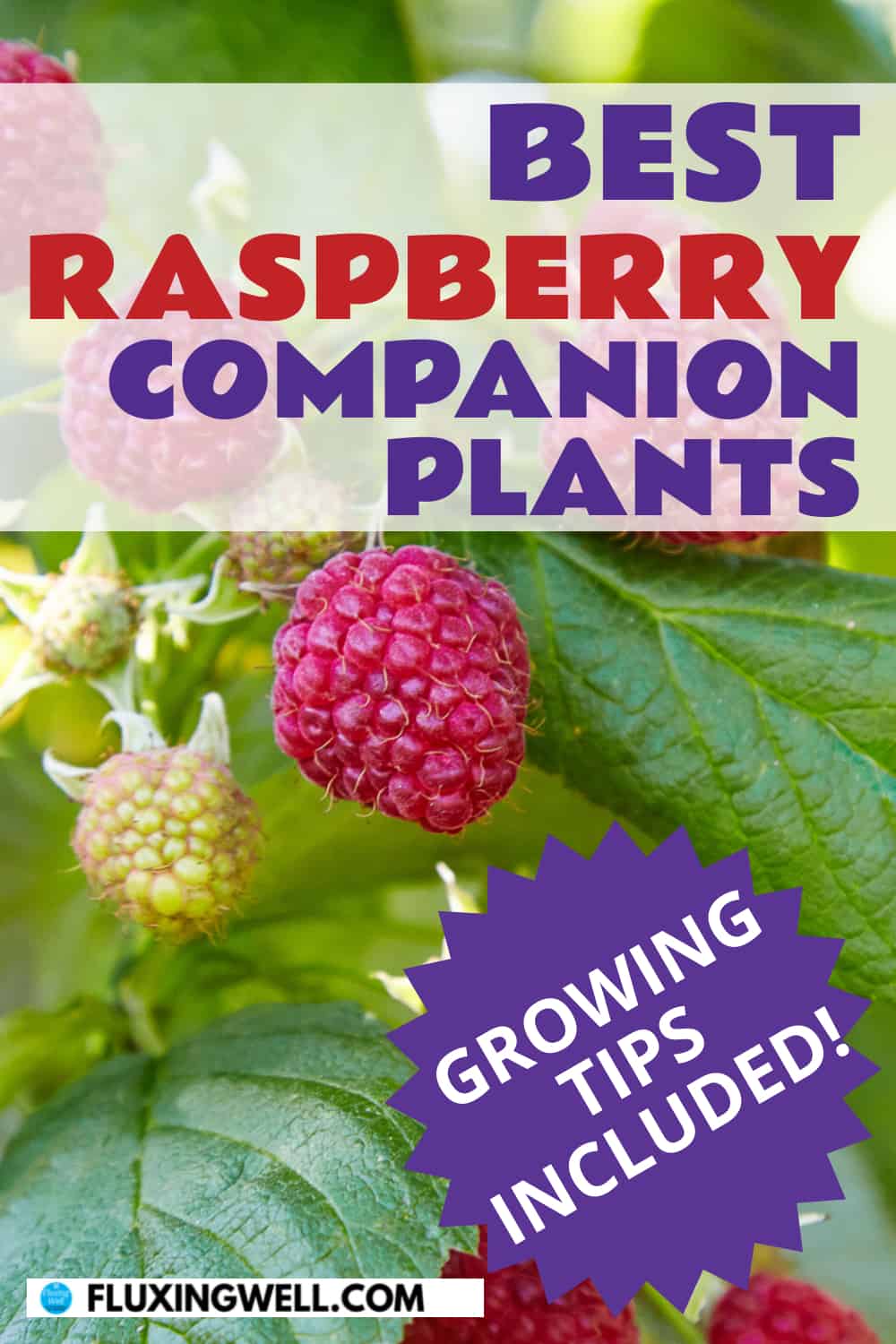
Whether you live in the United States, Canada, the UK, or anywhere else, you can find out about the best place to plant raspberries, the best fertilizer for raspberries, and whether raspberries need a lot of water. Get a handy chart listing companion plants for raspberries as well. Fun fact: According to the North American Raspberry Blackberry Association (NARBA), raspberries (and blackberries as well) are not true berries like blueberries. Each blueberry is a single fruit with seeds in the center, while each raspberry is made of individual drupelets (great word), and each drupelet contains a seed. I’ve been growing and harvesting raspberries for over 25 years, using them in recipes year-round. If you are looking for a delicious addition to your plant collection, read on to learn how simple it is to grow raspberries in your garden.
Table of Contents
Why I Love Growing Raspberries
My love for raspberries began at quite a young age when I would eagerly anticipate picking raspberries in my grandparent’s urban backyard garden in Vancouver, B.C. Raspberries with vanilla ice cream was one of my favorite treats. I now have a spot to grow raspberries of my own which I have tended for a few decades. I enjoy making a host of raspberry treats, including raspberry blueberry jam, seedless raspberry jam, raspberry syrup, raspberry scones, plus white and dark chocolate raspberry truffles. Raspberries are a great theme for a party. If you are a fan of raspberries, read on to learn about planting and growing this fabulous crop.
What Makes a Good Companion Plant?
A good companion plant is one that offers various benefits to its neighboring plants, such as minimizing pest and disease issues, which helps enhance their growth, health, and overall productivity. Here are some key qualities that make a good companion plant:
Pest Control: Companion plants may repel pests or attract beneficial insects that prey on pests, helping to reduce pest damage without the need for chemical pesticides.
Pollinator Attraction: Plants that attract pollinators such as bees, butterflies, and hummingbirds can improve pollination and fruit set in neighboring plants, leading to higher yields.
Soil Improvement: Some companion plants have deep roots that help break up compacted soil, while others fix nitrogen or add organic matter to the soil, improving soil fertility and structure for neighboring plants.
Complementary Growth Habits: Companion plants with different growth habits, such as tall plants providing shade for shorter ones or ground covers suppressing weeds, can maximize space and resources in the garden.
Disease Resistance: Certain companion plants may emit chemicals or compounds that inhibit the growth of pathogens or pests, reducing the risk of disease in neighboring plants.
Seasonal Considerations: Companion plants that thrive during different seasons can provide continuous benefits throughout the year, such as early bloomers attracting pollinators or cover crops protecting soil during the off-season.
Aesthetic Value: Companion plants with attractive foliage, flowers, or fruits can enhance the visual appeal of the garden while providing practical benefits to neighboring plants.
Raspberry Companion Flowers
These raspberry companion flowers not only help deter pests but also attract beneficial insects and pollinators, ultimately promoting the health and productivity of raspberry plants. Here are some good companion flowers for raspberry plants and the reasons why they work well together:
Calendula (Calendula officinalis): Calendula flowers attract beneficial insects like ladybugs and lacewings, which prey on pests that can harm raspberry plants. They also add a pop of color to the garden.
Marigolds (Tagetes spp.): Marigolds repel certain pests like nematodes and beetles, which can harm raspberry plants. Their bright flowers also attract pollinators, which can increase raspberry yields.
Nasturtiums (Tropaeolum majus): Nasturtiums are known for repelling aphids, whiteflies, and cucumber beetles, which can damage raspberry plants. They also attract beneficial insects like predatory wasps and hoverflies.
Raspberry Companion Fruit
By interplanting companion fruit species with raspberries, you can maximize garden space, improve pollination, and create a diverse and resilient ecosystem that supports healthy plant growth and abundant fruit production. Here are some excellent companion fruit plants for raspberry bushes and the reasons why they complement each other:
Apples (Malus domestica): Apple trees provide shade and wind protection for raspberry plants while attracting pollinators with their blossoms. Additionally, fallen apple leaves can help suppress weeds and enrich the soil with organic matter as they decompose.
Blueberries (Vaccinium spp.): Blueberries have similar soil pH requirements as raspberries and can thrive in acidic soil conditions. Planting them together allows for efficient use of space and resources while providing a diverse range of fruits for harvest. In our garden patch, we have raspberries and blueberries planted in the same row to simplify the rototilling process in the spring. The tractor can easily avoid the whole row.
Cherries (Prunus spp.): Cherry trees offer similar benefits to apple trees, providing shade, wind protection, and pollinator attraction for raspberry plants. They also produce delicious fruit that can be harvested at different times of the year, extending the fruiting season in the garden.
Cranberries (Vaccinium macrocarpon): Cranberries are acid-loving plants like raspberries, so they thrive in similar soil conditions. Planting them together allows for efficient use of space and resources while providing a variety of fruits for harvest.
Currants (Ribes spp.): Currants, like raspberries, are members of the Ribes genus and have comparable growing conditions. They attract different pests and diseases than raspberries, reducing the risk of cross-contamination and promoting overall garden biodiversity.
Elderberries (Sambucus spp.): Elderberries attract beneficial insects such as pollinators and predatory insects, which can help improve fruit set and control pests that may affect raspberry plants. Additionally, elderberries provide shade and wind protection for raspberries.
Gooseberries (Ribes uva-crispa): Gooseberries are another member of the Ribes genus and share many of the same benefits as currants when grown alongside raspberries. They offer a variety of flavors and colors, adding diversity to the fruit garden.
Hazelnuts (Corylus spp.): Although technically not a fruit, but often planted in orchard rows like fruit, hazelnut trees provide structural support and wind protection for raspberry plants while attracting beneficial wildlife such as birds and small mammals. Additionally, hazelnuts add visual interest to the garden with their foliage and nuts.
Serviceberries (Amelanchier spp.): Serviceberries attract pollinators and beneficial insects while providing shade and wind protection for raspberry plants. Their early spring blossoms also signal the start of the growing season, attracting attention from pollinators.
Strawberries (Fragaria spp.): Strawberries make great companions for raspberries because they have shallow roots and can grow together without competing for soil nutrients. Additionally, strawberries act as ground cover, suppressing weeds and conserving soil moisture for raspberry plants. We have one strawberry patch in the same row as our raspberries and blueberries.
Raspberry Companion Herbs
Planting companion herbs alongside raspberry bushes helps create a biodiverse and pest-resistant garden ecosystem that promotes healthy plant growth and abundant fruit production. Here are some beneficial companion herbs for raspberry plants along with the reasons why they work well together:
Basil (Ocimum basilicum): Basil emits a strong aroma that deters pests like mosquitoes, flies, and thrips, protecting raspberry plants from infestation. It also attracts pollinators such as bees and butterflies, which can improve fruit set and yield.
Borage (Borago officinalis): Borage is a great companion for raspberries because it attracts bees and other pollinators, helping to increase fruit set. It also has deep roots that can help improve soil structure and nutrient uptake for raspberry plants.
Chamomile (Matricaria chamomilla): Chamomile attracts beneficial insects like hoverflies and parasitic wasps, which prey on pests such as aphids and caterpillars that can damage raspberry plants. Its shallow roots also help improve soil structure and nutrient uptake.
Chives (Allium schoenoprasum): Chives repel aphids, Japanese beetles, and raspberry beetles, which can all damage raspberry plants. Plus, their purple flowers attract pollinators like bees and butterflies.
Lavender (Lavandula spp.): Lavender attracts pollinators such as bees, which can increase fruit set in raspberry plants. Its aromatic foliage also repels pests like moths and fleas, reducing the risk of infestation.
Lemon balm (Melissa officinalis): Lemon balm has a strong lemon scent that repels pests like mosquitoes and gnats, creating a protective barrier around raspberry plants. Its flowers attract pollinators, enhancing fruit set and yield.
Mint (Mentha spp.): Mint helps repel pests such as aphids, ants, and flea beetles, which can harm raspberry plants. Its spreading nature also acts as a living mulch, suppressing weeds and conserving soil moisture around the raspberry bushes.
Rosemary (Rosmarinus officinalis): Rosemary repels pests such as carrot flies and cabbage moths, protecting raspberry plants from infestation. Its fragrant foliage also attracts pollinators like bees, enhancing fruit set and yield.
Thyme (Thymus spp.): Thyme emits a strong scent that repels pests like cabbage worms and spider mites, which can damage raspberry plants. Its low-growing habit makes it an ideal ground cover, suppressing weeds and conserving soil moisture.
Raspberry Companion Vegetables
When you plant companion vegetables alongside raspberry bushes, you can create a productive garden environment that supports healthy plant growth and enhances overall yields. Here are some beneficial companion vegetables for raspberry plants along with the reasons why they work well together:
Beans (Phaseolus spp.): Beans are nitrogen-fixing plants, which means they can enrich the soil with nitrogen, benefiting nearby raspberry plants. Additionally, their tall vines can provide a natural trellis for raspberries to climb, saving space and supporting plant growth.
Carrots (Daucus carota): Carrots have shallow roots that can coexist with raspberry plants without competing for soil nutrients. Interplanting carrots with raspberries can help maximize space in the garden while providing a nutritious and versatile crop.
Garlic (Allium sativum): Garlic repels pests like aphids, Japanese beetles, and raspberry borers, which can damage raspberry plants. Planting garlic around raspberry bushes can help deter these pests and reduce the need for chemical pesticides.
Lettuce (Lactuca sativa): Lettuce has shallow roots and grows well in the shade provided by raspberry plants. Interplanting lettuce with raspberries can help maximize space in the garden while providing a nutritious and delicious crop.
Onions (Allium cepa): Onions repel pests such as aphids, thrips, and onion flies, which can harm raspberry plants. Interplanting onions with raspberries can help create a barrier against pests while providing a flavorful and versatile crop for culinary use. There is a border row next to our raspberry plants that I usually plant with wildflowers, but I am going to plant onions there to try to keep the deer away.
Peas (Pisum sativum): Peas also fix nitrogen in the soil, improving fertility for raspberry plants. They can be grown as a cover crop during the raspberry off-season to prevent soil erosion and suppress weeds, ultimately benefiting soil health and raspberry growth.
Radishes (Raphanus sativus): Radishes are quick-growing and can help break up compacted soil around raspberry plants, improving soil aeration and drainage. Additionally, radishes attract beneficial insects like ladybugs and parasitic wasps, which prey on pests that can harm raspberry plants.
What Should not be Planted Near Raspberries?
There are certain plants that should not be planted near raspberries due to various reasons such as competition for resources, susceptibility to similar pests and diseases, or allelopathic effects (chemicals released by one plant that inhibit the growth of another). Here are some plants to avoid planting near raspberries:
Blackberries: While blackberries are closely related to raspberries, they can compete with raspberries for sunlight, water, and nutrients if planted too close together. It’s best to separate them to prevent overcrowding and competition. Where we live, blackberries are invasive and could potentially take over the garden space, so I would not plant blackberries anywhere in our garden. I leave them in their wild state around the edges of our farm.
Eggplants: Eggplants are susceptible to verticillium wilt and other soil-borne diseases that can affect raspberries. Planting them near raspberries can increase the risk of disease transmission and reduce overall plant health.
Fennel: Fennel produces allelopathic compounds that can inhibit the growth of neighboring plants, including raspberries. Planting fennel near raspberries can stunt their growth and reduce yields.
Peppers: Peppers can be susceptible to verticillium wilt, which can also affect raspberries. Planting peppers near raspberries can increase the risk of disease spread and reduce the yield and quality of both crops.
Potatoes: Potatoes are susceptible to many of the same pests and diseases as raspberries, including potato beetles and verticillium wilt. Planting them near raspberries can increase the risk of infestation and disease spread.
Tomatoes: Tomatoes are susceptible to many of the same diseases as raspberries, such as verticillium wilt and blight. Planting them near raspberries can increase the risk of disease transmission and reduce the overall health of both crops.
Walnut Trees: Walnut trees release juglone, a chemical compound that inhibits the growth of many plants, including raspberries. Planting raspberries near walnut trees can result in poor growth and yield due to the allelopathic effects of juglone.
Raspberry Companion Plant Quick Reference Chart
| Raspberry Companion Plants | |
| Raspberry Companion Plants: Flowers | Raspberry Companion Plants: Fruit |
| Calendula | Apples |
| Marigolds | Blueberries |
| Nasturtiums | Cranberries |
| Currants | |
| Raspberry Companion Plants: Herbs | Elderberries |
| Basil | Gooseberries |
| Borage | Hazelnuts |
| Chamomile | Serviceberries |
| Chives | Strawberries |
| Lavender | |
| Lemon Balm | Raspberry Companion Plants: Vegetables |
| Mint | Beans |
| Rosemary | Carrots |
| Thyme | Garlic |
| Lettuce | |
| Worst Raspberry Companion Plants | Onions |
| Blackberries | Peas |
| Eggplant | Radishes |
| Fennel | |
| Peppers | |
| Potatoes | |
| Tomatoes | |
| Walnut Trees | |
Common Raspberry Planting and Growing Questions
What is the best month to plant raspberries?
The best month to plant raspberries is typically in early spring or late fall, when the weather is cooler and the plants are dormant. This allows them to establish their root systems before the heat of summer or the harshness of winter.
How many years does it take for a raspberry bush to produce fruit?
Raspberry bushes generally take about one to two years to produce fruit after planting. In the first year, they focus on establishing roots and foliage growth, while in the second year, they typically produce a full crop of fruit.
Where is the best place to plant raspberries?
The best place to plant raspberries is in a sunny location with well-draining soil. Raspberries thrive in full sun, receiving at least 6 hours of direct sunlight per day, which promotes healthy growth and fruit production. Additionally, well-draining soil helps prevent waterlogged conditions, which can lead to root rot and other diseases.
What kind of soil do raspberries need?
Here are some additional details about the best type of well-drained soil for raspberries. Raspberries prefer soil that is rich in organic matter, with a pH between 5.5 and 6.5. Loamy soil with good drainage and fertility is ideal for raspberry cultivation. Adding compost or aged manure can improve soil structure and fertility, ensuring optimal growth and fruit production.
What is the best way to plant raspberries?
The best way to plant raspberries is to dig a trench or individual holes for each plant, spaced about 2-3 feet apart in rows. Place the plants at the same depth as they were in their nursery containers, and backfill with soil, gently firming it around the roots. Water thoroughly after planting, and mulch around the plants to conserve moisture and suppress weeds.
What is the best fertilizer for raspberries?
You can purchase special fertilizer made just for berries that is approved for organic gardening. This provides essential nutrients like nitrogen and phosphorus, promoting healthy plant growth and fruit production. Additionally, incorporating organic matter such as compost into the soil can improve soil structure and fertility for raspberries.
How much water do raspberries need?
Raspberries need about 1 to 1.5 inches of water per week, especially during dry periods or when fruits are developing. It’s important to provide consistent moisture to the plants, but avoid overwatering, as soggy soil can lead to root rot. Watering deeply and infrequently is generally recommended, allowing the soil to dry out slightly between waterings.
Need More Planting Ideas?
Check out the tips for the best companion plants for eggplant to learn what to grow with those beauties. If you like the idea of companion planting, you might be interested in reading about the best companion plants for pumpkins, sunflowers, garlic, asparagus, rosemary, spinach, or the best companion plants for lavender. Get tips for growing stunning dahlias. Are you a beginning gardener? Try planting some foolproof, easy-care perennials, or learning about the best companion plants for columbine. There are so many exciting plants to grow!
Keep Track of Your Garden with a Journal Logbook
Now that you have learned about some compatible companion plants, keep track of your planting ideas, goals, and plans with a free garden journal logbook. Choose the pages you want to print and customize them as you wish to record monthly, weekly, and daily garden tasks, lists, weather, and planting arrangements. There are also grid pages for easily designing the layout of your vegetable garden, flower garden, or landscape. Print it out and put it into a notebook you can take with you to the garden (that’s what I do). It’s nice to have all of your garden information in one place.
Free Online Garden Planner Layout Template
Now that you know which are the best companion plants for raspberries, you might need a way to plan your garden layout. Whether you are planting vegetables, flowers, or herbs near your rosemary plant, this online garden planner can help you visualize your design and bring it to life. With garden tasks that need your attention, this is one way to save time.
It’s fully customizable when you make your own copy and includes two editable chart pages for noting planting specifications.
Get my free online garden layout planner template!
Organize Your Garden Tasks with a Free Garden Planner Notebook
As a result of needing to keep track of garden tasks throughout the year, I decided to begin a garden planner notebook. It has a page for each month, along with notes pages. If a garden planner notebook seems like a good idea to you, good news! You can get it here!
Get the garden notebook!
Have a wonderful week, and may all of your raspberry-growing endeavors meet with success!

Lisa Mitchell is a wife, mom, and school librarian who likes to grow fruit, herbs, vegetables, and flowers on her family’s small Pacific Northwest farm. To learn more about what this website has to offer gardeners, click on over to the Garden page.
Like what you read here? Please give it a share!
Want more great garden, food, or travel ideas? Follow FluxingWell on Pinterest, Facebook, Instagram, and X for the latest posts, tips, and inspiration.


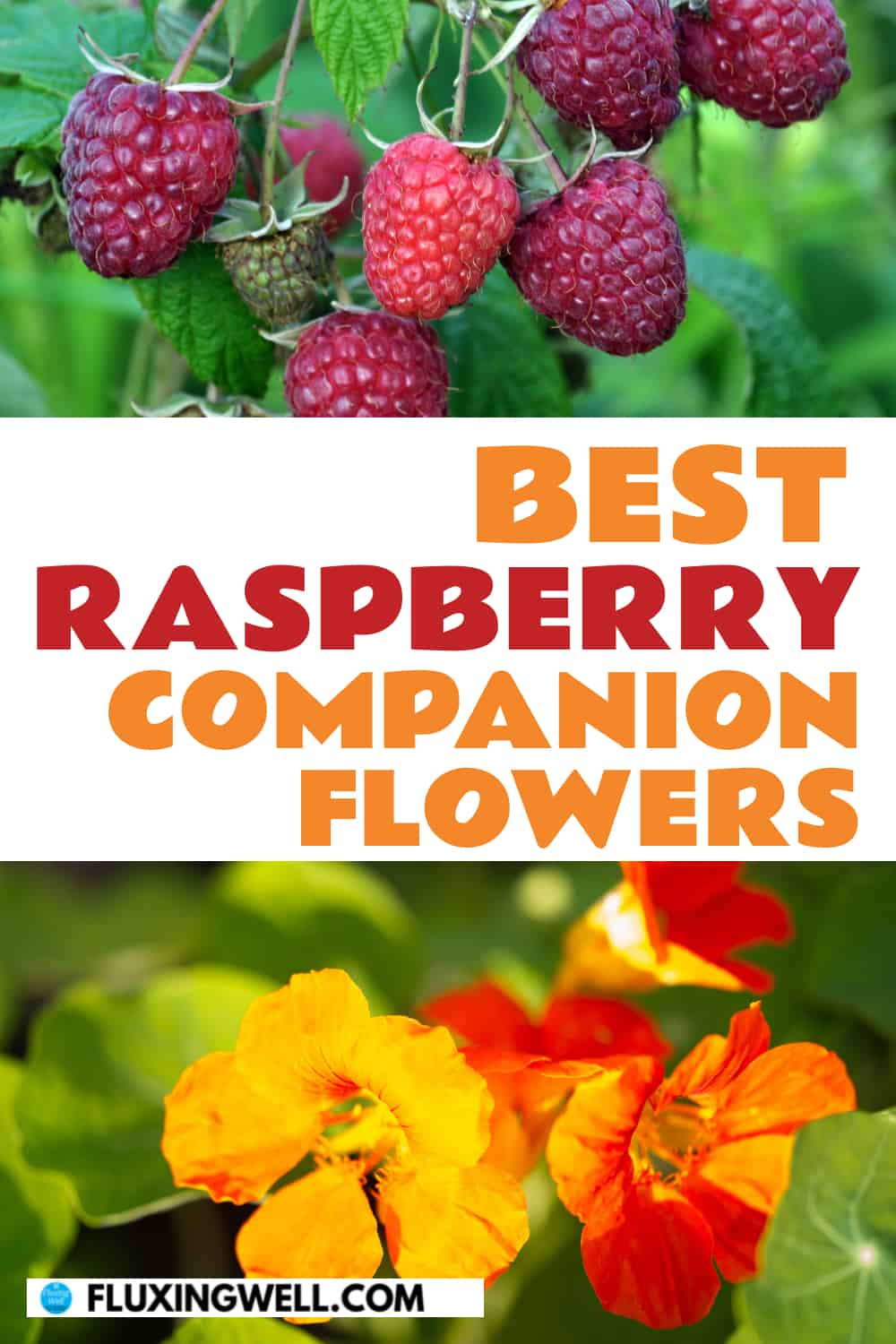
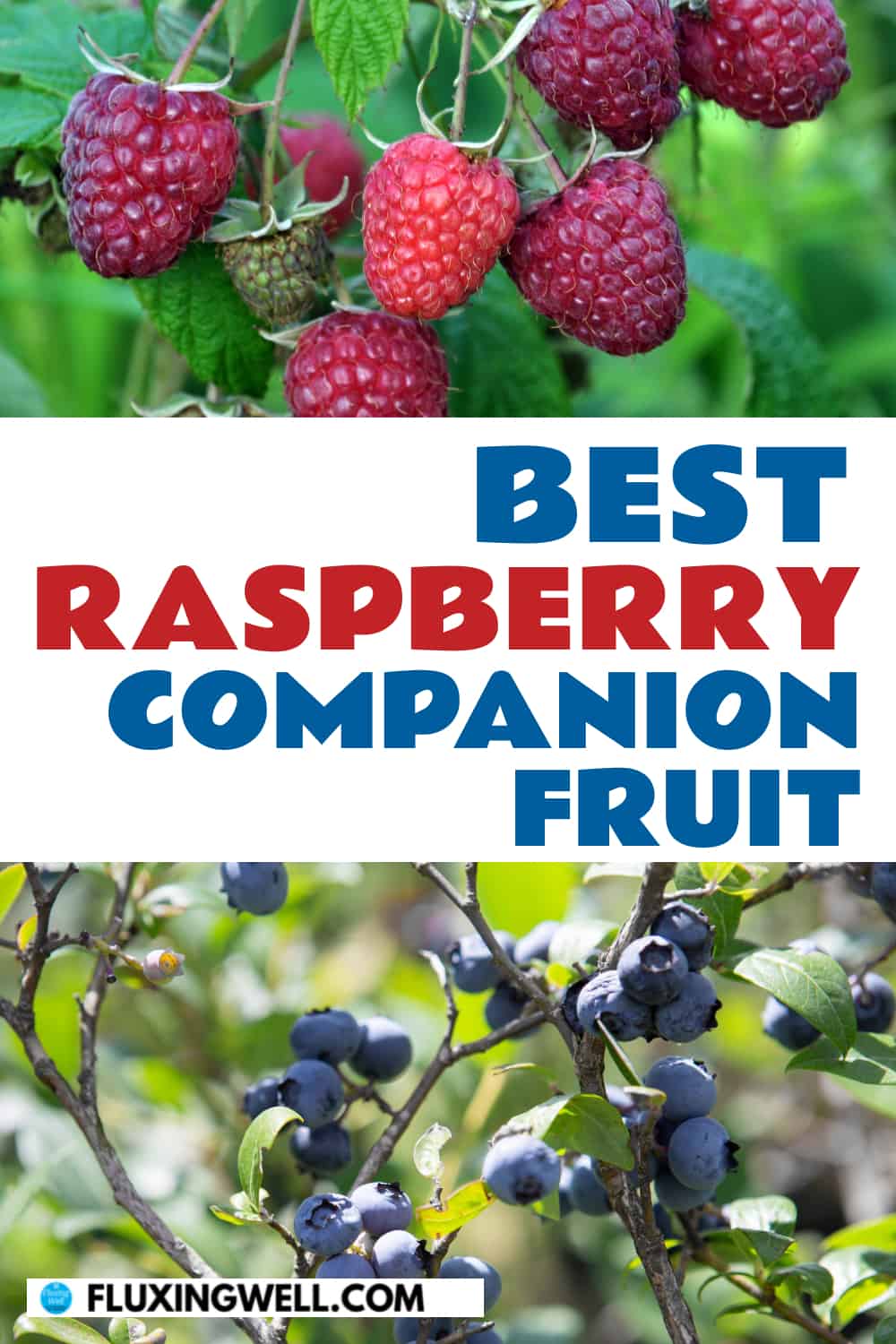
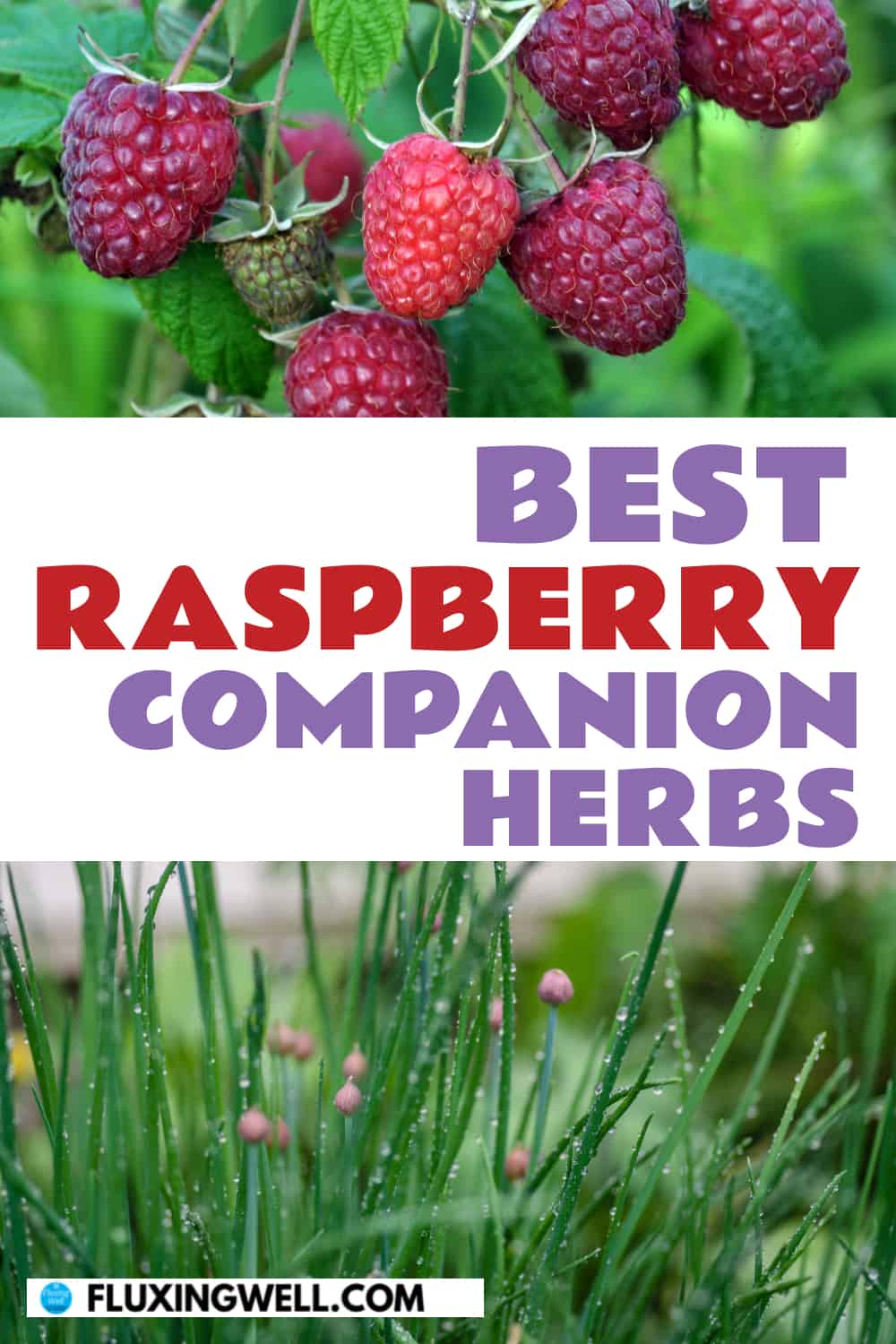
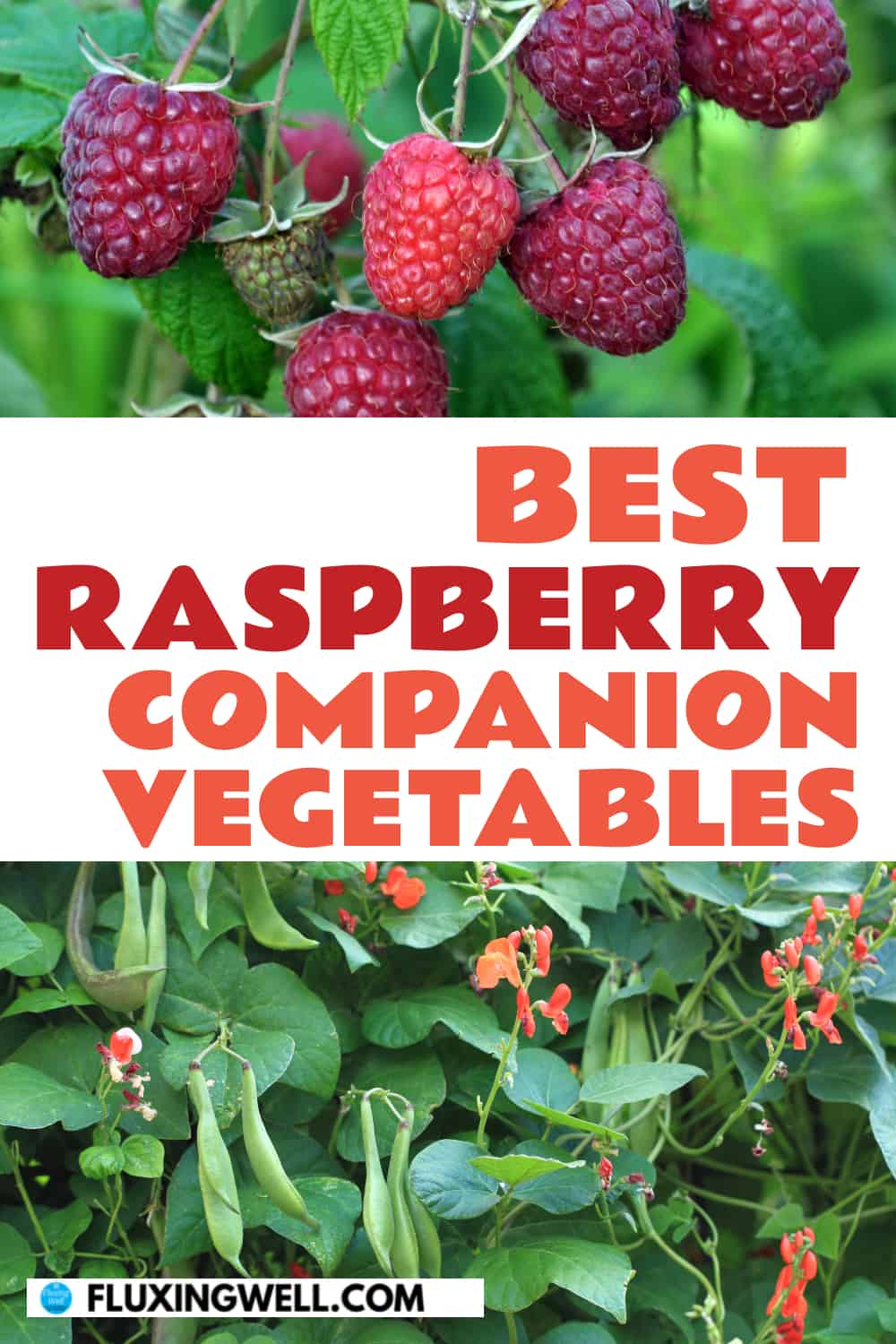
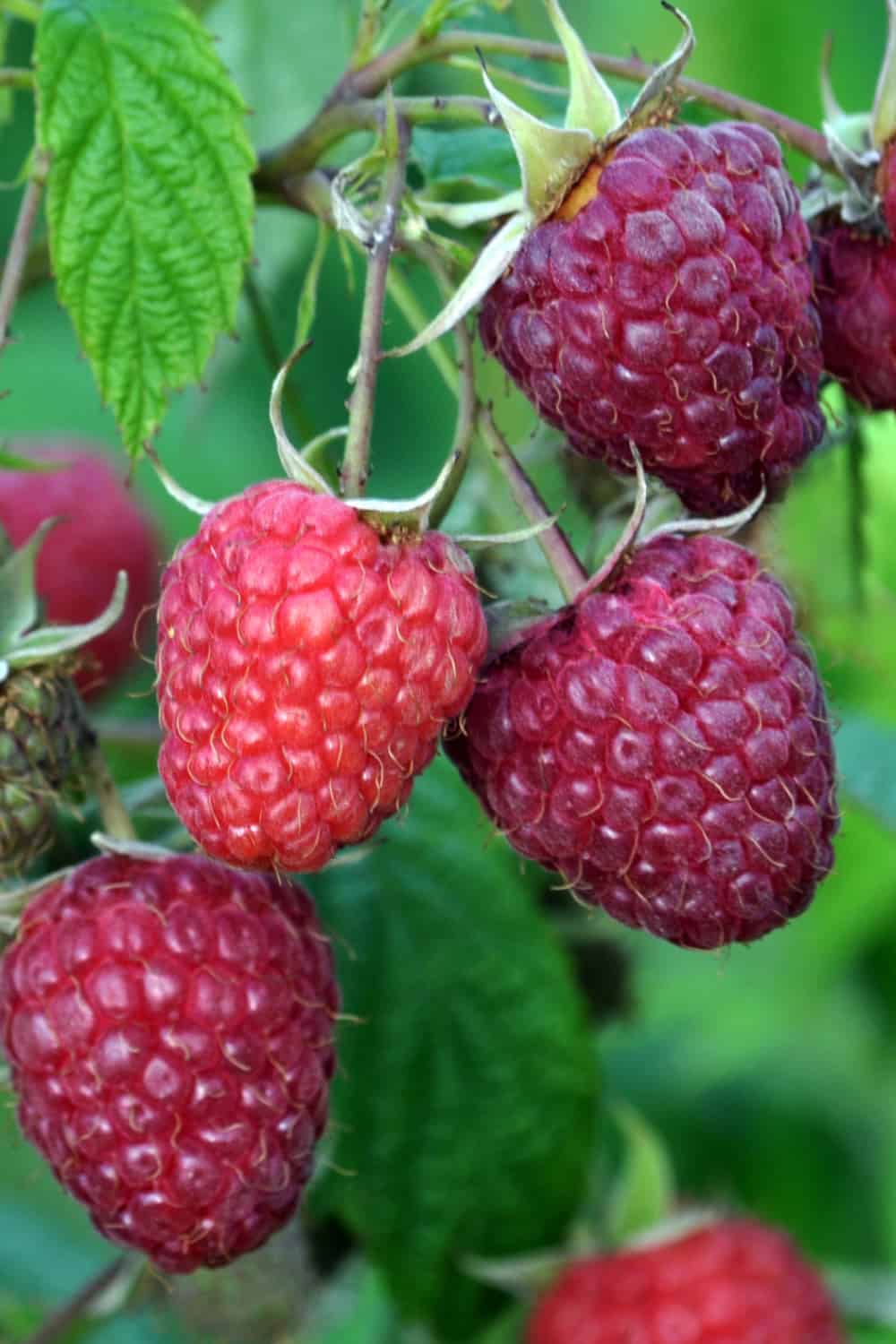


Raspberries with vanilla ice cream sounds amazing! I have never tried planting raspberries but it is good to know that lavender works as a companion plant. I have been successful growing lavender in the past 🙂
Nice! I would like to plant even more lavender near my raspberries, since they are such good companion plants, and lavender is deer-resistant.
Thank you for all of the raspberry planting tips. I’m glad the companion plants I have around my raspberries now are the right ones.
Great! I hope your raspberries thrive with their companion plants.